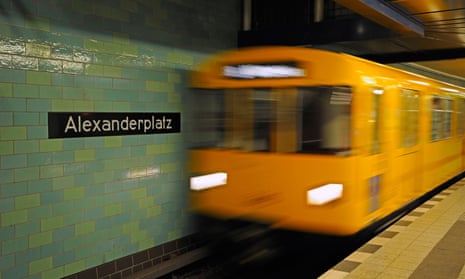Berliners could pay as little as €1 a day to use public transport for a year under plans to wean the German capital off its cars and reduce air pollution, its mayor has announced.
“Step by step I want to follow the goal of introducing an annual public transport ticket for €365,” Michael Müller told Neue Zürcher Zeitung. An annual ticket normally costs €761.
Such a move would make Berlin the latest German city to emulate what has come to be known as the “Vienna model”: public transport use in the Austrian capital has shot up since the operator Wiener Linien lowered the price of an annual season ticket from €449 to €365 in May 2012.
In Vienna, 822,000 people, almost half the city’s population, have an annual ticket, and the percentage of journeys made by underground, tram or bus has increased to 38% – compared with 27% in Berlin, 23% in Munich and 18% in Hamburg.
Several German cities are investigating season-ticket models along Viennese lines, as city authorities across Europe examine ways to meet EU pollution targets.
A €365 ticket has been trialled since the start of the year in Bonn and the south-west city of Reutlingen. Under the umbrella of the “lead city” initiative, Essen, Herrenberg and Mannheim will also receive funding from the federal government to examine whether other forms of reduced-priced ticketing can persuade locals to leave their cars behind and hop on a bus or subway instead.
Munich is also looking into ways to fund a €365 annual travel ticket after the Bavarian state premier, Markus Söder, called for such a scheme on the campaign trail last year.
Yet many municipal authorities are finding that slashing ticket prices comes with fresh challenges. If €365 tickets manage to increase the number of people using public transport, network providers also need to buy bigger or longer trains and pay for them to shuttle people across the city at shorter intervals.
In Vienna’s case, Wiener Linien receives €700m in subsidies from the city and the national government a year. Two measures have helped to stem the cost: raising parking fines by 60% since 2012; and a “subway tax” for employers, which amounts to about €2 a month for each employee.
In the “car nation” of Germany, there are concerns that cities either lack the means to subsidise a switch to public transport, or that citizens are more reluctant to part with their vehicles.
In Bonn, only 5,258 out of 17,000 available €365 season tickets have been taken up since the two-year trial was introduced on 1 January. A spokesperson for the local transport network said it expected uptake to increase as old season tickets ran out over the course of the coming months. But the trial has already illustrated the scale of the challenge: a permanent offer of €1-a-day travel would cost a relatively small city like Bonn an additional €23m a year.
In Berlin, a similar scheme would come with additional annual costs of about €100m, according to the newspaper Tagesspiegel. The Green party, a junior coalition partner in the city government, has voiced reservations about Müller’s proposal.
“The proposal came as a surprise,” a transport spokesman, Harald Moritz, told Berliner Zeitung. “Somehow you have to make up the difference – and for now that would fall on the taxpayer.”
